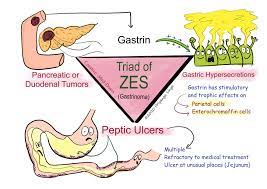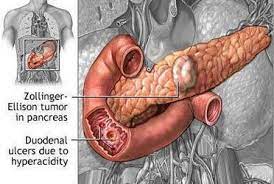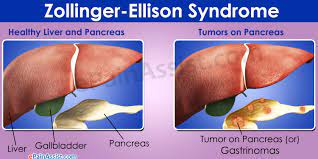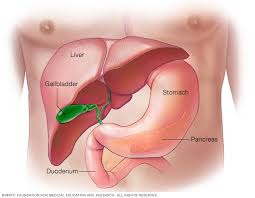Zollinger-Ellison syndrome
- medicorum sacramentum
- Feb 11, 2022
- 3 min read
Zollinger-Ellison syndrome is a condition where one or more tumours known as gastrinomas cause your stomach to produce too much acid. These tumours are present in the pancreas or in the duodenum. Our stomachs produce an acid known as hydrochloric acid (HCl) which has a pH of around 1.5 to 3.5 (which means it is a strong acid). Too much of this acid causes severe damage to our bodies.
WHO DOES IT AFFECT
Zollinger-Ellison syndrome is only diagnosed to around 1 to 3 people out of a million each year. There's no age limit to who can have this condition but it is often diagnosed between 20 to 50 years of age and is seen to be more common in men than women.
According to the National Institute of Diabetes and Digestive and Kidney Disease, 80% of the diagnosed have no other underlying condition and the other 20% have another genetic disorder known as multiple endocrine neoplasia type 1. This genetic disorder is associated with the formation of tumours on the endocrine glands (e.g pancreas) and was initially called Wermer syndrome. People who have a family history of this disorder are more likely to have it and have Zollinger-Ellison syndrome.
CAUSES
To date, all we know about Zollinger-Ellison syndrome is that the stomach produces too much acid due to the increased levels of a hormone known as gastrin. Gastrin is produced by the duodenum and pancreas and when Gastrinomas form, they induce excess production of gastrin. What causes these tumour formations is unknown and can only be linked to another disease.
SYMPTOMS
Zollinger-Ellison symptoms are similar to those of common diseases such as peptic ulcer disease and GERD and therefore is often misdiagnosed.
Symptoms include:
diarrhoea, which may sometimes be the only symptom
heartburn
nausea or vomiting
Unintended weight loss
Abdominal pain or discomfort
In severe cases,
chest pain
persistent vomiting
problems breathing
problems or pain while swallowing
signs of bleeding in the digestive tract
sudden, sharp stomach pain that doesn’t go away
weakness or feeling faint
When the patient sees a doctor about the above symptoms it is important for them to let the doctor know if they have had any over-the-counter acid-reducing medication such as omeprazole (Prilosec, Zegerid) as these may hide your symptoms.
DIAGNOSTIC TOOLS
If the physical exam and background check of the patient is consistent with the features of the disease, the doctor will conduct a few more exams to confirm the diagnosis.
Fluid samples
Under this, we can classify blood tests to check for gastrin levels and a stomach acid test where either a tube enters through your nose and into the stomach to collect some acid to check for acidity or upper gastrointestinal endoscopy is performed.
During the upper gastrointestinal endoscopy, the lining of your digestive tract can be scanned and tumours can be identified. At times a GI endoscopy is combined with an x-ray to examine the bile and pancreatic ducts, this method is known as ERCP.
Imaging tests
Under this category, we have CT scans, MRI scans, angiographies and endoscopic ultrasounds. These search for physical presentations of this syndrome such as masses (tumours).
TREATMENT
After a thorough examination, the patient can now be treated.
Often doctors remove large tumours through surgery. Patients who don't have multiple endocrine neoplasia type 1 (MEN1) are recommended the surgery and this will cure them. However, those with MEN1 commonly have small tumours in difficult places that will be hard to extract therefore surgery is not encouraged. If the gastrinomas are cancerous and spread to organs such as the liver chemotherapy is advised.
Other than surgery all patients are prescribed PPIs (Proton pump inhibitors) such as pantoprazole. This helps reduce the amount of acid produced by the stomach which will prevent ulcers.
Zollinger-Ellison syndrome is an extremely rare disease that disguises itself as a common illness but it is very treatable if caught on time.
Written by: Sakshi Desphande
Edited by: Svasti Tewari
Citations






Comments